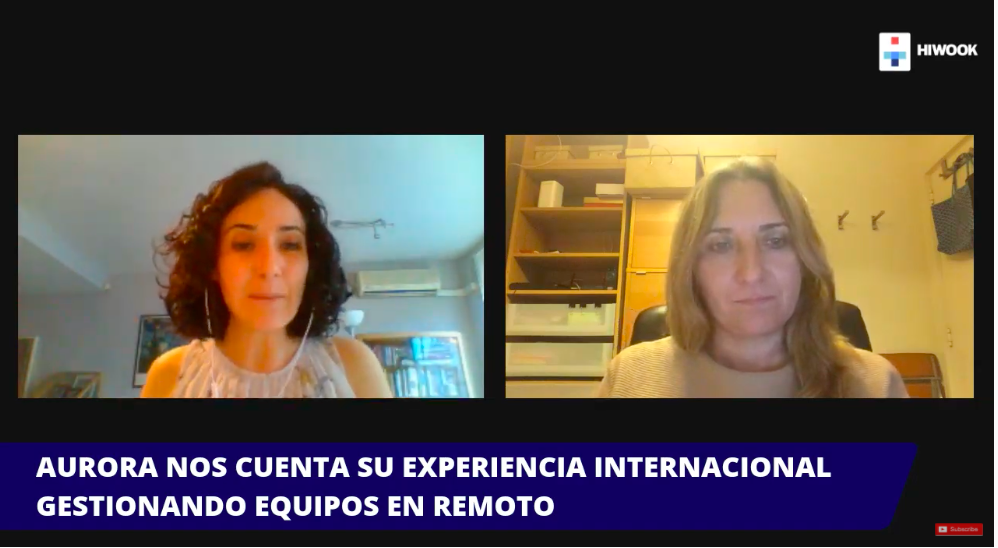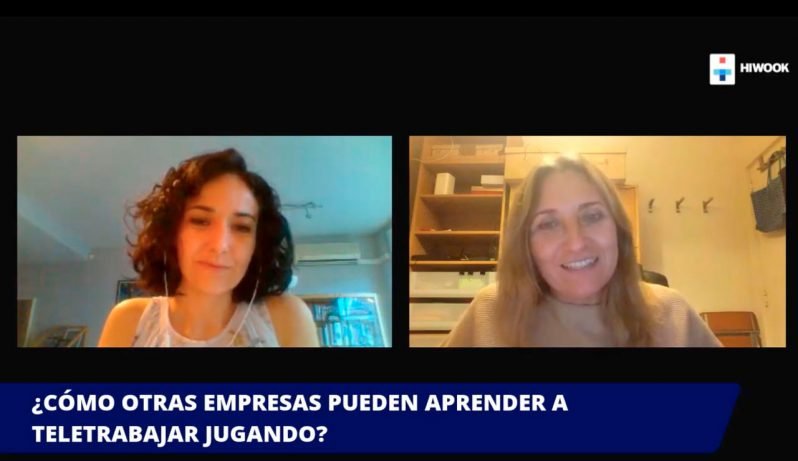Working from home is nothing new. We’ve been taking advantage of it as long as technology has allowed us to do so, and it’s only gaining steam as we move into the future. The current health crisis, however, triggered by the Coronavirus, has thrust this way of working into the spotlight, making it the only possible option for many working professionals.
María Gutiérrez, CEO and founder of Hiwook, and a very active member in Human Resources forums, immediately identified the relevance of this topic for many HR and company managers who, overnight, had to send their staff home to work.
This is exactly what happened at Gamelearn, a Spanish-based company known for its game-based learning platform. Gamelearn employees have been telecommuting since March 11, before the state of emergency was declared in Spain.
Well aware of the challenges that telecommuting poses for many organizations, María organized a webinar to speak with Aurora Martínez, Gamelearn COO and Managing Director. In this virtual talk, Aurora shared her experiences with telecommuting both now, in the midst of the Coronavirus crisis, and previously, in other organizations she’s been a part of.

Support for telecommuting must come from the top
Aurora’s career has led her to hold leadership positions in education-related companies such as Pearson and McGraw-Hill. In her opinion, the key to maintaining a healthy work-life balance has always been the explicit support from company managers to work from home. At the end of the day, the managers are the ones who have to be convinced that teams can be effectively motivated and managed remotely.
Aurora pointed out from her managerial experience that, during the current crisis, two maxims have worked for her: “communicate with transparency” and “it’s better to communicate too much than not at all”. During the COVID-19 outbreak, Gamelearn management has embodied this approach in Spain and Mexico, where the company also has offices.
Since the shift to working from home was announced in one of their monthly “General Meetings,” Gamelearn has enjoyed decidedly positive feedback from its staff about the whole process. They have been able to make the change seamlessly and keep team motivation, communication, and efficiency up
Although, what made the massive transition to telecommuting much easier was the mutual trust between management and staff. This is something that Gamelearn already had, since before the outbreak employees were able to work from home one day a week.
Basic rules to make sure telecommuting runs smoothly
During the webinar, Aurora shared that she is a big fan of the book Scaling Up and its prescriptions in some areas. In short, when teams are telecommuting, it’s important to set certain times for everyone to be available. Additionally, the status of each team member should be monitored in daily meetings.
María adds: these meetings should be quick. Each attendee has three minutes to talk about what they have done, what they are going to do, and if they have come across an obstacle, ask for help to overcome it.
In circumstances of prolonged telecommuting for the entire staff, it’s also important not to neglect the emotional status of the team. Aurora emphasized this and mentioned some examples of how this sometimes-tricky situation is being handled at Gamelearn. “We’ve created emotional checklists for managers. This way we can get a feel for how different employees are handling and approaching the current situation.”

Gamelearn has several employees from different countries living in Spain far from their friends and families. There have also been cases of COVID-19 personally affecting the staff or their family or friends. “We have to make sure that the emotional needs of all our employees are met. We have to show them we care,” explains the COO of Gamelearn.
To this end, the ‘lunch & learn’ sessions organized by the company are useful in training middle managers in how to properly oversee and motivate their teams while telecommuting.
Other initiatives promoted by Gamelearn management include small weekly rehashes of what Aurora calls the “vital signs” of the company. This e-meeting covers news of interest to the staff and other essential data related to the progress of the company. Additionally, Aurora is responsible for sending weekly emails to the whole company summarizing the last seven days. The email is meant to be informative, but also motivational.
Letting creativity breathe
Aurora’s weekly emails, among other things, often introduce workplace challenges. These challenges are for the whole company and involve people recording their special talents, whatever they may be, and sharing them with the rest of the company.
In a company dedicated to game-based learning, of course, they couldn’t leave playfulness by the wayside. Team spirit is also cultivated through Happy Fridays, a company hangout, now virtual, that is held once a month. It can be either unorganized (coworkers getting together to have a laugh in a video call) or organized (everyone playing bingo, as happened last month.)
For Aurora, in this moment as in others in her professional life, common sense must prevail. Telecommuting is about finding a balance for both parties and, of course, to achieve this, companies must keep their eyes on their main objectives while not forgetting about the employees that make the company tick. With this in mind, we can all move forward together.



Leave a Reply